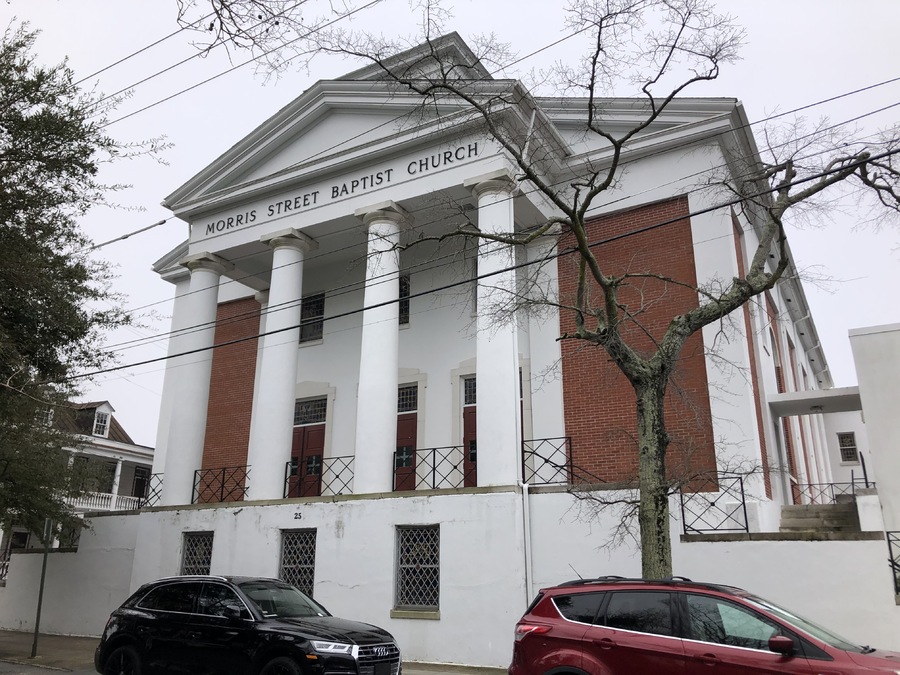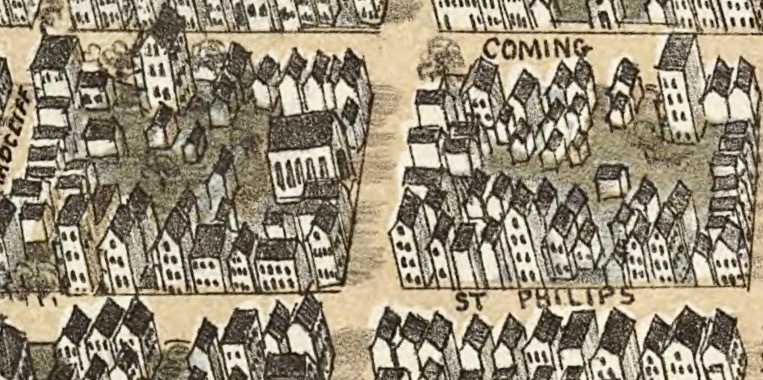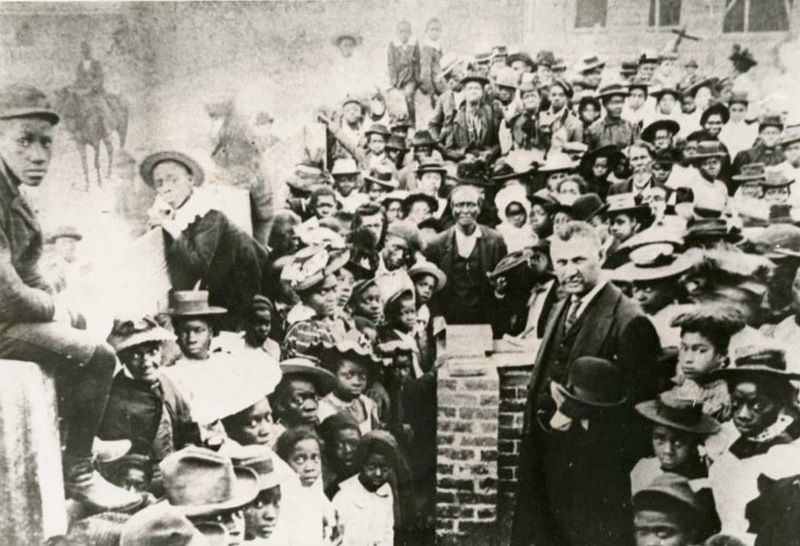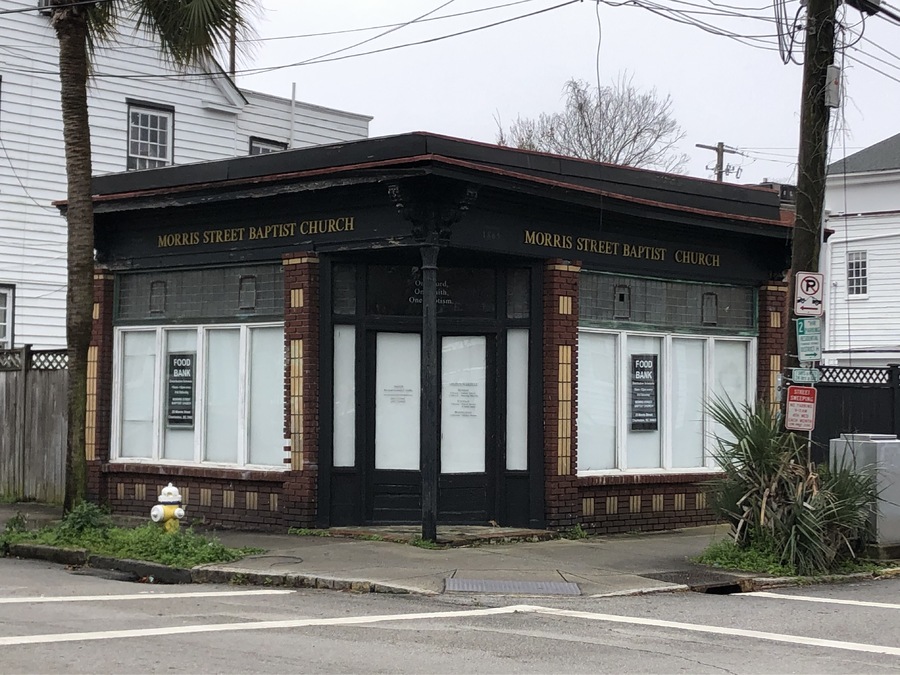Morris Street Baptist Church, 25 Morris Street

Church communities have been a cornerstone in Charleston’s Black community for decades, serving as a sacred space for political organizing, community building, education, and spiritual nourishment.
Church communities have been a cornerstone in Charleston’s Black community for decades, serving as a sacred space for political organizing, community building, education, and spiritual nourishment. Historically, Charleston has been a majority Black city, and as a result, many of its Black churches established their roots in communities long before the abolishment of chattel slavery.
Before the Civil War, many enslaved Africans and free people of color in Charleston were forced to worship in white churches. Although they worshiped at these churches, they were discriminated against and treated as second-class members. After the Civil War, there was an exodus of Black Charlestonians from white establishments, and they began setting up churches throughout the Charleston area to meet the needs of the large population of freedmen and women. The unique cultural characteristics of these Black church communities were finally able to flourish when they began to acquire their own buildings to worship in independently. Black churches, like Morris Street Baptist Church, became a strong cultural, and even political, force in the area.
On May 9, 1865, Morris Street Baptist Church became one of the first African-American churches to be established in South Carolina. Seventy-three free and formerly enslaved African Americans organized this church under the leadership of Father Jacob Legare. Members of Morris Street Baptist Church, along with representatives from fourteen other churches, formed the Gethsemane Baptist Association in 1867, the first Black Baptist association in the state. Legare led the church until his death in 1885; by that time the church had over 2,700 members, with ten mission stations outside of Charleston city proper. It had become one of the leading Black Baptist Churches in the state of South Carolina, serving as the nucleus for the spread of more Black Baptist churches in Charleston and the surrounding Lowcountry. John Lewis Dart became the church’s second pastor and its first Black pastor.
John Lewis Dart was born in 1854 in Charleston, South Carolina to William Dart, who had been enslaved, and Susan Frenwick, a free person of color. Frenwick purchased William Dart in 1849 and he was listed as a free person ten years later. Because John Lewis Dart’s parents were free prior to the Civil War, and thus had a relatively higher social standing than most freedmen, he was afforded the opportunity to attend the prestigious Avery Normal Institute, an elite private school founded after the Civil War to educate African Americans in Charleston.
Dart graduated from Avery Normal Institute in 1872, becoming valedictorian of the first graduating class. He later went on to graduate from Atlanta University and studied at the Newton Seminary, where he became an ordained Baptist minister. He returned to Charleston in 1886, where he became active in organizing relief efforts for African Americans amidst a massive earthquake that rocked the area that same year.
In 1894, Dart established the Charleston Normal and Industrial Institute to educate the city’s impoverished Black community. He attempted to get the municipality to take over and subsidize the school. Although he ultimately failed in this effort, he laid the foundation for the establishment of Charleston’s first Black public high school, Burke Industrial High School, formerly known as the Charleston Colored Industrial School.
Dart continued his leadership as the Pastor of Morris Street Baptist Church for sixteen years. Under Dart’s leadership, Morris Street Baptist Church improved its original building, expanded membership, and organized Central and Memorial Baptist churches.
Building on the foundation that Dart laid, his successor, Reverend Randall Kemp, became the third pastor in 1904. Under his leadership its membership continued to expand and a new church was built in 1909. The fourth pastor, Reverend J.C. Dunbar, began his 34-year ministry in 1922. Dunbar continued to expand the church's auxiliaries, forming the Board of Trustees, Boy and Girl Scout troops, the Brotherhood, and many more.
This church also served as a meeting site during the Cigar Factory Strike of 1945-46. The Local 15, which typically held separate union meetings for its Black and white members, held its first interracial meetings at Morris Street Baptist Church. The Southern Conference for Human Welfare (SCHW) organized a lecture series called the “New South Lecture Series,” which consisted of monthly events held at the church to help raise funds to support the striking workers. Many different sectors of people and organizations in Charleston and the Lowcountry supported the strike, such as local Black churches, Avery Research Institute teachers and faculty, the NAACP, the National Maritime Workers’ Union (NMWU), the Citizens Political Action Committee, and more. The church continued to be a bedrock institution for political, cultural and social uplift, serving as the venue for community meetings addressing the plight of Black Charlestonians.
The tradition set forth by Morris Street Baptist Church’s pioneers continues to grow today. Originally, 73 Christians of African descent met in a humble two-room building; today the church owns multiple facilities used to serve the greater Black Charleston community with programs providing childcare, adult education, a food bank, and much more. The “Mother church among Negro Baptists,” remains a shining example of the great contributions the Black community has made to Charleston and the Lowcountry.
Images



